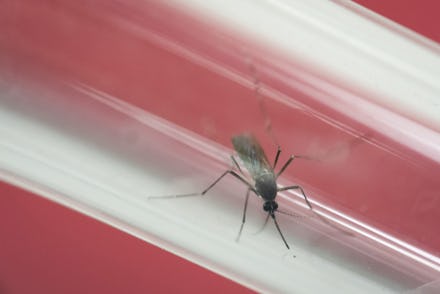Zika Test: How to Get It, How Much It Costs and How to Know if You Need It

Zika is on the rise in the United States — with reports this past week of local transmission of the virus — meaning even those who haven't traveled abroad could be at risk, particularly in southern states like Florida and Louisiana.
There's not yet a vaccine for the mosquito-borne illness, but testing is available: The Centers for Disease Control recommends screening for anyone with Zika symptoms who has traveled to a region with the virus or has had unprotected sex with a person who has.
The test is free for eligible patients, CDC representative Benjamin Haynes said in an email to Mic.
To get tested, go to your primary care physician and describe your symptoms. Your doctor can then send you to get tested by your local health department at no cost to you, Haynes wrote.
Unfortunately, you are unlikely to get results right away. Turnaround takes about three weeks, Haynes said, and the wait can be even longer in the summer, when insect-borne illnesses are common.
Why does it take so long?
Not all labs are certified to test for Zika, so your doctor will likely have to write you a referral to separate location, where the lab will collect a sample of blood, urine or saliva for analysis. (Note that some evidence suggests the urine test is more accurate than the blood screen.)
If you're concerned about the lengthy time frame, there is a faster option.
Back in April, the first commercial Zika test won approval from the Food and Drug Administration. Provided by the testing company Quest Diagnostics, the test costs $500.
Now, insurance may cover some of that, and Quest says it will offer the test to uninsured patients for only $120.
Why you don't want to sleep on this
Zika isn't a terribly debilitating illness for most; symptoms include rashes, red eyes, joint pain, or a fever. Most of the time, patients can just wait it out as they would the flu, relying on the classic combination of aspirin, bed rest and lots of chicken soup.
But that's also part of what makes Zika so risky: It's very easy to confuse your symptoms with something more benign.
The disease is incredibly dangerous for expectant mothers, as it can cause microcephaly, a birth defect linked to developmental problems and even death.
Researchers are cautioning that the Zika outbreak is already worse than a lot of Americans realize, and could quickly become a threat to national security. The CDC recently issued a travel advisory for a square-mile of north Miami —the first time the agency has issued a warning of that kind within the continental U.S.
If you think there is any chance you have Zika, you need to discuss your concerns with your doctor immediately, especially if you or your partner is pregnant, or thinking about becoming pregnant.